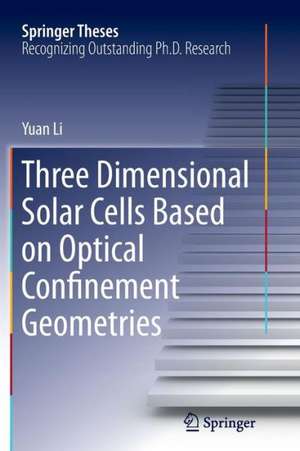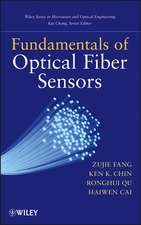Three Dimensional Solar Cells Based on Optical Confinement Geometries: Springer Theses
Autor Yuan Lien Limba Engleză Paperback – 13 dec 2014
Additionally, this book discusses the importance of these methods in achieving the goal of high efficiency solar cells and suggests a possible application in large-scale photovoltaics business, like solar farms.
| Toate formatele și edițiile | Preț | Express |
|---|---|---|
| Paperback (1) | 635.01 lei 6-8 săpt. | |
| Springer – 13 dec 2014 | 635.01 lei 6-8 săpt. | |
| Hardback (1) | 639.25 lei 6-8 săpt. | |
| Springer – 28 noi 2012 | 639.25 lei 6-8 săpt. |
Din seria Springer Theses
- 18%
 Preț: 997.88 lei
Preț: 997.88 lei -
 Preț: 389.88 lei
Preț: 389.88 lei - 15%
 Preț: 646.94 lei
Preț: 646.94 lei - 18%
 Preț: 943.43 lei
Preț: 943.43 lei -
 Preț: 399.29 lei
Preț: 399.29 lei - 18%
 Preț: 944.99 lei
Preț: 944.99 lei - 15%
 Preț: 636.80 lei
Preț: 636.80 lei - 18%
 Preț: 941.05 lei
Preț: 941.05 lei - 15%
 Preț: 643.16 lei
Preț: 643.16 lei - 15%
 Preț: 642.68 lei
Preț: 642.68 lei - 18%
 Preț: 1103.62 lei
Preț: 1103.62 lei - 20%
 Preț: 558.82 lei
Preț: 558.82 lei - 18%
 Preț: 1112.30 lei
Preț: 1112.30 lei - 18%
 Preț: 944.19 lei
Preț: 944.19 lei - 18%
 Preț: 1109.92 lei
Preț: 1109.92 lei - 18%
 Preț: 1217.27 lei
Preț: 1217.27 lei - 15%
 Preț: 640.06 lei
Preț: 640.06 lei - 15%
 Preț: 636.45 lei
Preț: 636.45 lei - 15%
 Preț: 640.06 lei
Preț: 640.06 lei - 15%
 Preț: 640.88 lei
Preț: 640.88 lei -
 Preț: 389.70 lei
Preț: 389.70 lei - 20%
 Preț: 563.89 lei
Preț: 563.89 lei -
 Preț: 393.35 lei
Preț: 393.35 lei - 15%
 Preț: 637.93 lei
Preț: 637.93 lei - 15%
 Preț: 641.85 lei
Preț: 641.85 lei - 18%
 Preț: 1225.94 lei
Preț: 1225.94 lei - 20%
 Preț: 551.36 lei
Preț: 551.36 lei - 18%
 Preț: 1229.10 lei
Preț: 1229.10 lei - 15%
 Preț: 639.25 lei
Preț: 639.25 lei - 18%
 Preț: 999.45 lei
Preț: 999.45 lei - 15%
 Preț: 640.06 lei
Preț: 640.06 lei - 18%
 Preț: 1220.45 lei
Preț: 1220.45 lei - 18%
 Preț: 1116.26 lei
Preț: 1116.26 lei - 18%
 Preț: 1110.72 lei
Preț: 1110.72 lei - 18%
 Preț: 1000.87 lei
Preț: 1000.87 lei - 18%
 Preț: 891.17 lei
Preț: 891.17 lei - 15%
 Preț: 640.06 lei
Preț: 640.06 lei - 5%
 Preț: 1154.07 lei
Preț: 1154.07 lei - 15%
 Preț: 635.96 lei
Preț: 635.96 lei - 15%
 Preț: 640.88 lei
Preț: 640.88 lei -
 Preț: 387.20 lei
Preț: 387.20 lei - 18%
 Preț: 1109.92 lei
Preț: 1109.92 lei -
 Preț: 385.25 lei
Preț: 385.25 lei -
 Preț: 385.25 lei
Preț: 385.25 lei - 18%
 Preț: 1112.30 lei
Preț: 1112.30 lei - 18%
 Preț: 999.45 lei
Preț: 999.45 lei -
 Preț: 386.99 lei
Preț: 386.99 lei - 15%
 Preț: 637.13 lei
Preț: 637.13 lei - 20%
 Preț: 554.20 lei
Preț: 554.20 lei - 20%
 Preț: 555.57 lei
Preț: 555.57 lei
Preț: 635.01 lei
Preț vechi: 747.06 lei
-15% Nou
Puncte Express: 953
Preț estimativ în valută:
121.51€ • 127.21$ • 100.54£
121.51€ • 127.21$ • 100.54£
Carte tipărită la comandă
Livrare economică 07-21 aprilie
Preluare comenzi: 021 569.72.76
Specificații
ISBN-13: 9781489997906
ISBN-10: 1489997903
Pagini: 184
Ilustrații: XXX, 154 p.
Dimensiuni: 155 x 235 x 10 mm
Greutate: 0.27 kg
Ediția:2013
Editura: Springer
Colecția Springer
Seria Springer Theses
Locul publicării:New York, NY, United States
ISBN-10: 1489997903
Pagini: 184
Ilustrații: XXX, 154 p.
Dimensiuni: 155 x 235 x 10 mm
Greutate: 0.27 kg
Ediția:2013
Editura: Springer
Colecția Springer
Seria Springer Theses
Locul publicării:New York, NY, United States
Public țintă
ResearchCuprins
Introduction.- Equivalent Circuit.- Optical Path in Cavity.- Spectral Response.- Individual Optical Confinement Geometry Device.- Integrated Optical Confinement Geometry Device.- Hybrid Optical Confinement Geometry Device.- Conclusion.- Appendices.
Notă biografică
Yuan Li received his Ph.D in Physics at the Center for Nanotechnology and Molecular Materials at Wake Forest University under supervisor David Carroll. Yuan has been published in approximately 25 journals, has conducted 6 conference talks and presentations, and holds 4 patents that include an electroluminescence device based on pentacene for electron injection layer, a quartz boat with lid for thermal evaporation, a device for white light based on complex emission, and an apparatus for cleaning substrates. His Honors include the Chinese Government Award for Outstanding Self-Financed Students Abroad (2011), BOE Scholarship awarded by BOE Technology Group Co., and National Graduate Mathematical Contest in Modeling.
Yuan Li, Wake Forest University, Winston-Salem, North Carolina, USA
Yuan Li, Wake Forest University, Winston-Salem, North Carolina, USA
Textul de pe ultima copertă
Three dimensional (3D) optical geometries are becoming more common in the literature and lexicon of solar cells. Three Dimensional Solar Cells Based on Optical Confinement Geometries describes and reveals the basic operational nuances of 3D photovoltaics using three standard tools: Equivalent Circuit Models, Ray Tracing Optics in the Cavity, and Absorber Spectral Response. These tools aide in understanding experimental absorption profile and device parameters including Jsc, Voc, Fill Factor, and EQE. These methods also apply to individual optical confinement geometry device, integrated optical confinement geometry device, and hybrid optical confinement geometry device.
Additionally, this book discusses the importance of these methods in achieving the goal of high efficiency solar cells and suggests a potential application in large-scale photovoltaics businesses, like solar farms.
Additionally, this book discusses the importance of these methods in achieving the goal of high efficiency solar cells and suggests a potential application in large-scale photovoltaics businesses, like solar farms.
Caracteristici
Summarizes the theoretical models and current development of 3D solar cells, which has drawn much interest from scientists and groups all over the world Provides excellent reference for scientists in conventional planar solar cell, especially advanced device fabrication and optical research Nominated as an outstanding contribution by Wake Forest University, North Carolina, USA Includes supplementary material: sn.pub/extras







